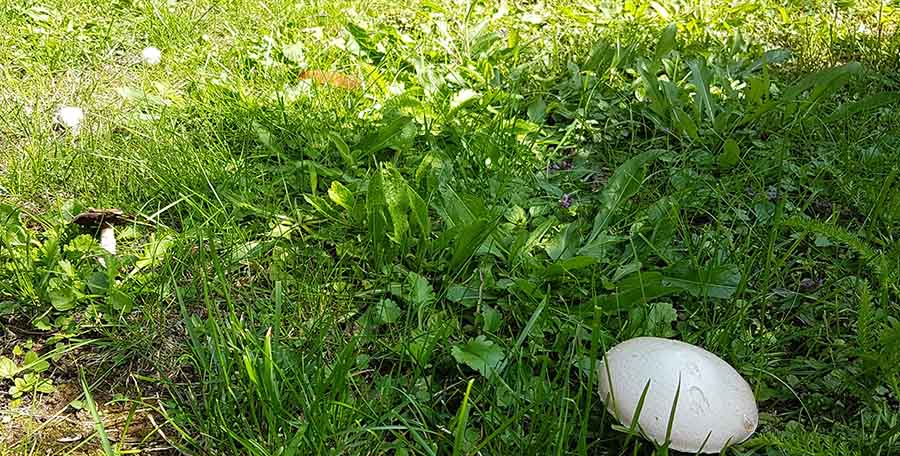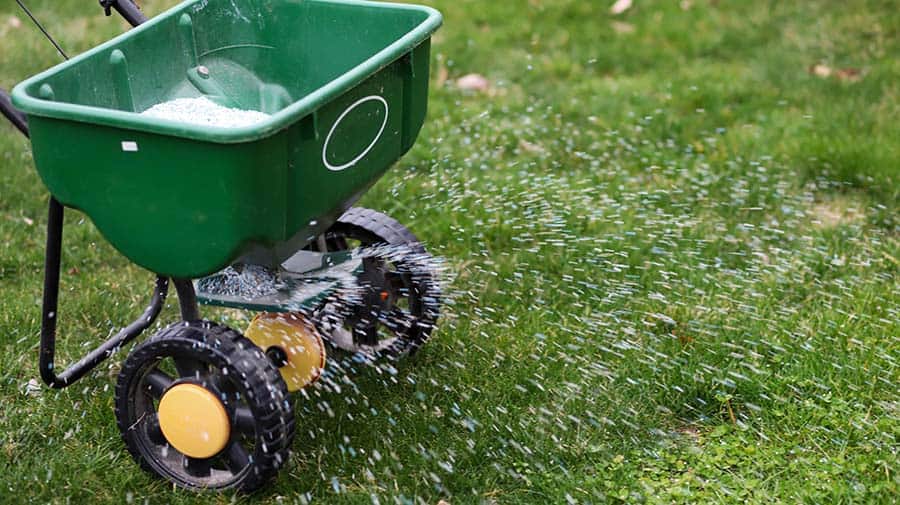Lawn fertilizer is one of the most commonly used substances on grass, but it’s not always the best solution. Most of us know that fertilizer can be found in organic and non-organic forms. If you’re trying to get rid of weeds without ruining your grass, you might be surprised by the requirements.
Lawn fertilizer can help weeds grow because it provides the necessary nutrition for healthy plants. You can get ‘weed and feed’ fertilizer that’s packed with herbicides to remove weeds without damaging the grass. Plucking weeds without using chemicals is a top method to prevent them from returning.
Throughout this article, you’ll also learn the following info about using lawn fertilizer on weeds:
- Whether or not your fertilizer will assist weeds
- Different solutions to use fertilizer while removing weeds
- The best method for a healthy, weed-free lawn
Will Weeds Benefit From Fertilizer?

Weeds are notorious for ruining lawns. We always think that they’re crowding our grass and tarnishing the appearance. However, weeds are just doing what they’re supposed to do in nature. One of the most important parts of lawn care is to recognize that the vast majority of plants need sunlight, water, and nutrients to grow.
With that in mind, here are a few reasons that weeds benefit from fertilizer:
- According to Lawn Care Academy, fertilizer offers a lot of the required components for all plant life. For example, it comes with nitrogen, phosphorus, and potassium. Since the term ‘weeds’ covers a broad spectrum of unwanted plants, it’s easy to see how they could benefit from having so much nutrition without being ruined.
- Many modern fertilizers are designed to be used with aerated soil. When you add oxygen to the soil, it gives life to deep-rooted weeds and grass. You’ll notice that the grass grows beautifully, but it’ll also promote the growth of dandelions, crabgrass, and other plants commonly referred to as weeds.
- When fertilizer is watered, the nutrients are activated. For lack of a better term, water allows the fertilizer to soak into the surrounding plants. Unfortunately, you’ll be evenly distributing nutrition-packed fertilizer throughout the weeds, grass, and other plants at the same time. The longer they grow, the deeper their roots will be.
Once you realize that grass isn’t too different from weeds in terms of nutritional requirements, you’ll understand how you can deal with the problem. There are countless solutions that are supposed to remove weeds without harming your lawn, but they don’t all work effectively.
If you want to know how you can use fertilizer without growing weeds, then proceed to the next section.
Tip: I’ve written in-depth articles about why plants need nitrogen, phosphorus and potassium. Check them out!
How to Use Fertilizer Without Growing Weeds
The good news is that you can grow a healthy lawn without dealing with weeds too often. One of the most common methods is known as ‘weed and feed’ fertilizer. You can use this type of fertilizer to add nutrition to your plants without having to worry about weeds getting in the way.
Weed and feed fertilizers work because they have all of the nutritional components necessary to promote healthy grass. However, they come with an herbicide that’s proven to take out weeds and other unsightly plants. Your grass will grow healthily, but weeds won’t be able to stand a chance.
Here’s how you can use weed and feed at home:
- Find a weed and feed fertilizer, such as Scotts Turf Builder Weed and Feed that you can get at Amazon. It’s made to remove twice as many dandelions and crabgrass as similar brands without raising the price. This budget-friendly weed and feed have enough fertilizer for 3,500 square feet, but you can choose to get a bigger size if you’d like.
- Decide how you’ll distribute the fertilizer. There are plenty of methods, such as spreading it by hand or placing it in a manual broadcast spreader. Whichever method you choose, make sure you’re able to cover the whole lawn evenly. If there are too many clumps, you could risk damaging your grass.

- Once you place the fertilizer, water the lawn immediately. When you wait too long, there’s a chance that the fertilizer will dry onto the grass. You should water it to allow the fertilizer to soak into the roots of all of the plants. This process will give excellent nutrition to your grass while breaking the roots of the neighboring weeds.
- Continue your normal watering schedule for one week, then analyze the situation. If the weeds are persisting through the weed and feed, it’s time to add a little bit more. If you notice that there are patches on the lawn, you might have overdone it. Fortunately, traditional fertilizer and proper watering techniques can repair fresh patches.
As you can see, weed and feed is an excellent choice for many situations. However, there are a notable amount of issues, as reported by some lawn owners.
To learn more about the most efficient methods to grow a healthy lawn minus the weeds, read on.
What’s the Best Way to Grow Grass Without Weeds?
Now that you know that weeds can grow with traditional fertilizer but not weed and feed, you might think the best option is clear. Unfortunately, that’s not always the case.
Weed and feed seem like a miracle that’s too good to be true. In short, it is too good to be true! You have to use it sparingly without overdoing it. Excess amounts of weed and feed used regularly can damage your lawn since it introduces too much herbicide.
As stated by Earth Easy, weed and feed can be toxic to certain types of grass and local animals. While there are many safe alternatives, you need to look for organic compounds.
Important note: These herbicides are considered slightly toxic to birds, bees, and pets. If you like to know more about that, I did some research on which lawn fertilizers are harmful to bees, you can check it out here.
Use these tips to get the perfect lawn:
- Start the lawn by following the aforementioned step-by-step process with weed and feed. Keep it spread evenly and try not to exceed one to two uses. There’s no need to use weed and feed or any other fertilizer for that matter, more than a few times per quarter. Overuse can and will ruin your lawn.
- Remove the weeds from their roots as soon as you can. Mowing weed can be counterproductive since it makes it harder for you to get a good grip on the base of it. By letting the weeds grow to a couple of inches, you’ll be able to put on a pair of gloves and pull out the roots to prevent them from regrowing.
- Use mulch and compost to add natural nutrients to the grass. While this might be good for weeds, you’ll be able to stop the roots from growing by filling the gaps with more grass. Wherever there’s grass, weeds can’t grow since the roots can’t get established.
Follow these simple tips to keep your lawn healthy throughout the year. Weeds might be a nuisance early on, but you can stop them in their tracks by flushing them out and keeping your grass growing.
Conclusion
Fertilizer shouldn’t be a weekly treatment for lawns since it can promote weed growth. However, you can use weed and feed to cut back on crabgrass, dandelions, and other common weeds. Make sure you don’t overuse any type of fertilizer, or you might risk harming the grass.
Here’s a quick recap of the post:
- Traditional lawn fertilizer can promote growing weeds and unwanted plant life.
- Too much fertilizer can be bad for your lawn.
- Use weed and feed sparingly to add an herbicide without harming the grass.
- Make sure you water your lawn after adding fertilizer.
- Remove weeds by their roots to keep them gone for good.

